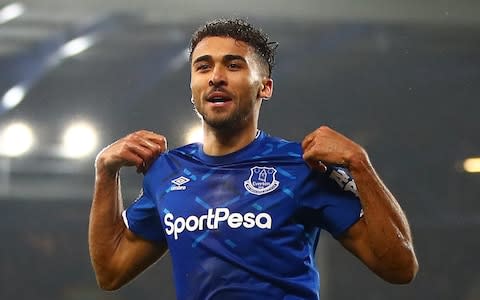Ronaldo, Zlatan, Shevchenko... Calvert-Lewin - why Everton's strikers are ready to benefit from Ancelotti's experience

It reads like a Who’s Who of 21st-century strikers. Zlatan Ibrahimovic. Didier Drogba. Andriy Shevchenko. Robert Lewandowski. Ronaldo. David Trezeguet. Filippo Inzaghi. Fernando Torres. Nicolas Anelka. Karim Benzema. Dries Mertens.
Carlo Ancelotti has spent two decades coaching the best. A former team-mate of Paolo Rossi and Marco van Basten also spent his playing career supplying some of the most feared forwards of their generation.
So it would have been easy to damn Dominic Calvert-Lewin by comparison with some of the attacking greats. Cristiano Ronaldo scored 61 goals in a season under Ancelotti. Calvert-Lewin has never got more than six league goals in a campaign.
But his sixth of the current season, a diving header to get Ancelotti a debut win against Burnley on Boxing Day, brought an unexpected tribute from Everton’s new manager. “He is a fantastic striker, in my opinion,” said the triple Champions League winner.
There have been times when it seemed Everton’s various managers and powerbrokers did not agree. They bought forwards in 2017, 2018 and 2019, often to take Calvert-Lewin’s place. Indeed, they signed the £25 million teenager Moise Kean in the summer when Ancelotti wanted to take his fellow Italian to Napoli.

Ancelotti called Kean “a fantastic talent.” He still picked Calvert-Lewin ahead of him on Thursday. If it was his first big decision, he got it right. In keeping with his reputation as an erratic finisher, Calvert-Lewin missed two chances. He took the third in spectacular style. He got the manager’s backing in a way he has not in the past. “I am not asking for a striker [in the January window] because up front we are really good," Ancelotti said.
But he challenged Calvert-Lewin to become a regular scorer. “He can improve his movement without the ball,” he said. “He has to be more focussed on the goal but, of course, he is really unselfish and he moves up and down, right and left.”
That was Calvert-Lewin’s role last season. He was outscored by Richarlison and Gylfi Sigurdsson but he excelled in Everton’s spring surge, dragging defenders out of position to create space for the big-money buys. He was the unselfish foil, the willing worker who lacked the ruthlessness many strikers show. But he has gone from averaging a goal every 469 minutes in 2017-18 to one every 174 now. It is a step in the right direction.

Ancelotti’s vote of confidence was typical. He looks to improve forwards by showing faith in them. At Parma, he refused to substitute Hernan Crespo when fans were jeering the Argentinian. He stayed on and scored.
Ancelotti works to make that trust mutual. “Drogba was not so easy at the beginning because he was a little wary and didn’t have a lot of confidence in me,” he recalled in his book Quiet Leadership. By the end of their first season together, Drogba had scored a career-best 37 goals and won the Golden Boot. Long before Drogba urged Chelsea to rehire Ancelotti, it was clear he had confidence in his manager. Nor was his scoring run a one-off. Lewandowski, Shevchenko and Inzaghi all had the most prolific seasons of their careers under Ancelotti. “Inzaghi is a strange animal,” Ancelotti noted, having used his degree in people to understand the poacher who specialised in scruffy goals.
AC Milan’s chief executive Adriano Galliani recalled that in the last training session before the 2007 Champions League final: “Pippo Inzaghi was completely out of sync. He was barely able to trap the ball. Any other coach would have chosen Alberto Gilardino [instead].” But Ancelotti still backed Inzaghi. He played and scored twice to defeat Liverpool and win his second Champions League.
Ancelotti’s input can be tactical. At Milan, he altered Shevchenko’s game to get him playing on the shoulder of the last defender, using his speed to run on to Andrea Pirlo’s through passes. More often, however, it is psychological.
“He is not just your coach, he is your friend,” Ibrahimovic, the top scorer in his Paris Saint-Germain team, later recalled. “Everything with him is a mind game. He likes to manipulate.”
They forged such a strong bond that when Ancelotti kicked a box at half-time and it hit Ibrahimovic on the head, the temperamental Swede just accepted it. He once called Ibrahimovic a “perfect striker”. And, of all Ancelotti’s great forwards, Calvert-Lewin could look to Ibrahimovic and Drogba, two giants with similar aerial ability as role models. He can study Ancelotti’s past and see that a manager with a PhD in the prolific rates him.

